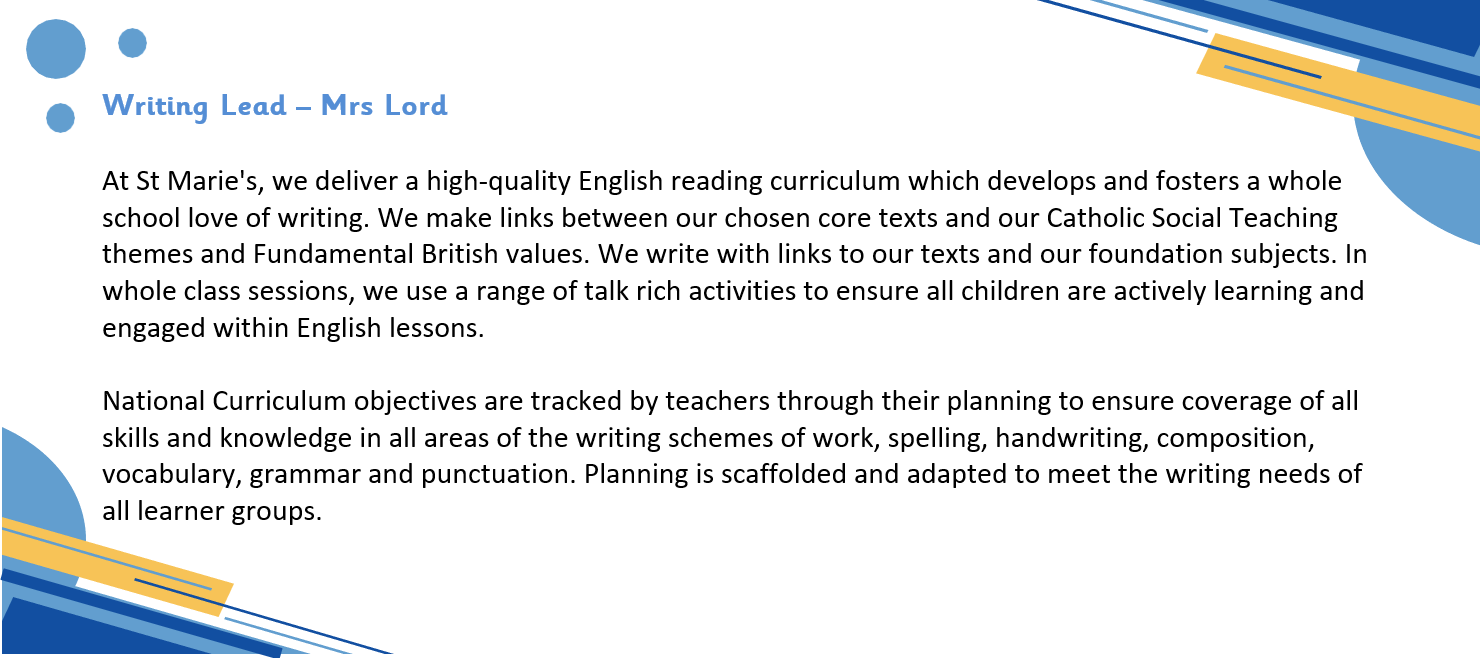
- Home
- Curriculum
- Subject Information
- Writing
Writing

Intent:
At St Marie's, writing is planned and taught using focus CLPE core texts. These texts are chosen by teachers with consideration of their class cohort needs. Sequential and coherent planning immerses children within a writing style that they can independently produce at the end of the lesson sequence. The children are taken on a journey to become immersed in the writing style.
Through CLPE activities and Talk For Learning strategies, we create a talk rich environment to develop pupils vocabulary and language knowledge and skills for independent writing. We have a poetry focus every term to build and develop pupils range of word and language patterns for independent writing.
Using Letterjoin programme, we plan sequential and coherent handwriting lessons to ensure children develop a legible and fluent cursive script.
We follow the Spelling shed scheme of work to plan sequential and coherent spelling lessons to ensure children become more accurate spellers.
Implementation:
Teachers plan a half termly overview of their teaching and learning of writing, this has focused writing outcomes as well as plotted weekly GPS objectives.
With a writing outcome focus, each lesson focusses on a manageable step of new learning based on the National Curriculum Writing Scheme of work.
High quality texts ensure that children in all year groups are given varied opportunities for writing. Key skills are taught and repeated; there are multiple opportunities to embed, apply and master key skills. Alongside key writing skills, we ensure extensive opportunities are available to develop and apply vocabulary, with an additional key focus on oracy development.
All year groups now plan their lessons using a 3-week writing block structure. This allows for consistency, progression and sequential writing and reading lessons across all year groups. This ensures great coverage and range of genres across year groups, opportunities for learning new skills and a chance to focus on teaching, reviewing, practising and embedding new/previous learning.
Planning follows the sequence below (Please see 3-week block structure attached):
KS1 follow a 3-week writing block structure:
Monday - Grammar linked to text type (wk1-3)
Tuesday - VIPERS and comprehension (wk1-3)
Wednesday - Power of Reading - identifying features (wk1)/ exploring vocabulary and oracy development (wk2)/ independent writing planning (wk3).
Thursday - Power of Reading hook and introduction to text (wk1)/ vocabulary development and shared writing (wk2)/ Independent write (wk3)
Friday - Power of Reading vocabulary and oracy development (wk1)/ Power of Reading vocabulary development and shared writing (wk2)/ Editing independent writing (wk3).
KS2 3-week writing block structure:
Monday - Identifying features related to genre (wk1)/ grammar linked to text type (wk2)/ Power of Reading- vocabulary development and share write opportunities (wk3)
Tuesday - VIPERS (wk1)/VIPERS (wk2) and independent writing plan (wk3)
Wednesday - Power of Reading Hook/intro (Wk1)/ Power of Reading vocabulary and oracy development (wk2)/ Independent writing- write/edit (cups and arms) (wk3)
Thursday - Power of Reading vocabulary and oracy development (wk1), grammar linked to text type (wk2), Independent writing- write /edit (cups and arms) (wk3)
Friday - Grammar linked to text type (wk1), Power of Reading vocabulary development and shared writing (wk2), VIPERS (wk3)
What a typical lesson looks like:
Flashback/Review: an opportunity for pupils to retrieve and build upon previously acquired skills, through a ‘Last Lesson, Last Unit, Last Year, Challenge’ approach.
Teach it/My Turn: Introduction to new learning with live modelling and explicit addressing of potential misconceptions.
Practise it/Our Turn: Children are given the opportunity to practise and use new transcription and composition writing skills. Learning can be independent and collaborative, all pupils participate through active learning strategies.
Prove it/Your Turn: Children apply new knowledge and writing skills: spelling, handwriting, writing composition, vocabulary, grammar and punctuation. These skills are developed and practised in a focused writing style eg. informal letter, persuasive argument.
Dig deeper: To ensure all children are appropriately challenged, the primary national curriculum writing scheme of work is used to plan activities to enable all children to extend their learning forward, broaden their knowledge and make progress at their level.
Impact:
We deliver opportunities for all skills to be learnt and developed and we give children time to practise and build on their own writing. It is important to us that our learners are exposed to a variety of learning resources and writing style examples across all areas of the curriculum
Texts used in whole class teaching often focus on texts which are just slightly above the reading level of the children in the class to ensure progression is made and high aspirations set.
Assessment
Assessment happens in every lesson using live marking. Children are given learning next steps to develop and move their learning forward. Writing is assessed formally by the class teacher termly. Teachers use Bromcom to record their assessment of writing and follow this up with pupil progress meetings.
Monitoring, Evaluation and Review
Teaching and learning of writing is captured through: Lesson drop ins, pupil voice, book looks, planning monitoring, NC objectives coverage monitoring, data drops (termly) and pupil progress follow up, internal and MAC moderation and staff coaching opportunities.